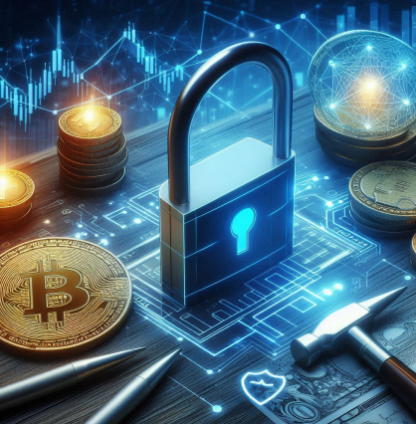The financial world is undergoing a transformation. Traditional finance, which used to be a monopoly of the banks and stock exchanges, is beginning to meet its confrontation with blockchain technology. At the heart of this change lie security tokens, which offer the means by which to make those physical assets "digital" whilst adhering to all compliance rules. They role their position between analogue and digital finance by providing stability and new technology. But what is a security token and what is their significance? Let's look at how they operate, what advantage they may have, and what implications they have on the direction of finance.
What Are Security Tokens?
A security token represents an ownership interest claim in the real world embodied on the digital, cryptographically secured, blockchain itself. Such assets can include not only stocks and bonds, but also real estate and even corporate stocks. Unlike cryptocurrencies like Bitcoin, security tokens are tied to tangible value and are subject to regulatory oversight. To illustrate, a security token linked to a piece of real property, for example, allows investors to claim an ownership stake in a smattering of that real estate. This is the potential of acquiring very good assets without significant capital expenditure.

A Quick Comparison: Security Tokens vs. Traditional Securities
Feature | Security Tokens | Traditional Securities |
Accessibility | Global, 24/7 trading | Limited to market hours |
Ownership Verification | Blockchain-based, instant verification | Paper-based or centralized databases |
Regulatory Compliance | Enforced through smart contracts | Enforced manually |
Fractional Ownership | Easy to implement | Difficult and costly |
How Security Tokens Bridge Traditional and Digital Finance?
- Enhanced Liquidity: Liquidity is one of the significant barriers in the traditional financial world, particularly, in real estate or private equity assets. Security tokens are one way of doing this by offering fractional ownership and secondary market trading. According to a PwC 2023 report, the tokenized real estate has the potential to unlock the $1.4 trillion of global liquidity in the next few years. Enabling small investors to invest creates dynamic markets in formerly illiquid markets.
- Lower Transaction Costs: In traditional finance, intermediaries (e.g., brokers, custodians, clearing houses) typically result in increased costs (fees). Security tokens are on a blockchain and hence can reduce the use of the intermediary and decrease the transaction costs. For instance, tokenized bond trading has been found to reduce costs by up to 60% compared to the previous model in a 2022 Deloitte report. These savings flow down to investors, opening up financial markets to wider participation.
Real-World Applications of Security Tokens
- Real Estate: Security tokens make real estate investing at the level of fractional ownership possible. Instead of buying a complete property, an investor can purchase tokens that have ownership claims in the property. Consider Aspen Digital, a tokenization of real estate in Colorado, which consists of a luxury resort. In 2018, investors could buy tokens equivalent to shares in the property. This democratized access to high-value real estate, previously limited to wealthy individuals or institutions.
- Private Equity and Venture Capital: Tokenization makes it easier (and so feasible) for individual investors to get in touch with high-potential companies and have access to private equity economy. Conventional private equity necessitates big capital injection and its long lock-up period. Security tokens allow investors to trade baskets of holdings, offering flexibility. In 2023, a venture capitalist firm, "tokenized" its portfolio in a way that investors could trade tokens that represent shares of the fund. This trend lowered the entry barrier and raised liquidity, one of the effects that led to greater diversity of investors.
- Art and Collectibles: Security tokens are also creating a ruckus in the arts world, too. For instance, the platforms Maecenas, will bring down high value artworks, allowing to buy a piece of the work as a whole. In 2021 the Maecenas tokenized Andy Warhol's 14 Small Electric Chairs and as a result made it accessible to a much wider circle of potential investors.

Regulatory Landscape: Balancing Innovation and Compliance
In contrast to cryptocurrencies, security tokens are strictly regulated in order to safeguard investors. They fall under securities laws, which vary by country. Security tokens are regulated in the United States by the Securities and Exchange Commission (SEC). Companies issuing security tokens will have to comply with their legal requirements, including Regulation D (private offerings) and Regulation S (involving international offering). Mandatory compliance can be sometimes imprinted on the token itself, embedded in the token code using smart contract, which means to enforce compliance with the regulations automatically. Europe is also highly relevant and securities token adoption is also at an advanced stage in countries such as Germany and Switzerland. The financial supervisory authority of Germany granted authorization of multiple tokenized bond products, which has the potential to lead to a greater development of the use in Europe.
Risks and Challenges
- Technical Complexity: Despite their potential, security tokens come with technical challenges. Blockchain technology is an extremely niche field of subject for beginners in the world of investing and digital assets exposure. Adoption could be slow because of the learning curve.
- Regulatory Uncertainty: Regulations surrounding security tokens are still evolving. There is no uniform regulation in different jurisdictions, which results in uncertainty for the foreign investor. However, increased level of visibility is expected by the time more and more countries come to standardize frames.
- Cybersecurity Risks: Since security tokens are carried out on blockchain network, they are susceptible to attacks. A breach can result in significant financial loss. Strong security features such as multi-signature wallets and cold storage are required to secure digital assets.
The Future of Security Tokens
The security token market is poised for exponential growth. A 2023 report by Markets-and-Markets predicts that the security token market will grow from $2 billion in 2023 to $12 billion by 2027, driven by increased adoption in real estate, private equity, and art. With the increasing maturity of blockchain technology and the settling of regulatory framework, it is likely that conventional financial institutions will adapt tokenization. This will result in the democratization of access across asset classes deepening the inclusivity and efficacy of the investing process. Security tokens are an exciting blend of traditional finance and novel technologies. By improving liquidity, reducing transaction costs and broadening access, they are changing the financial landscape. As adoption grows, security tokens will play an important disruptive role in the border between traditional and digital finance by guaranteeing that access to investment opportunity is available to all.






